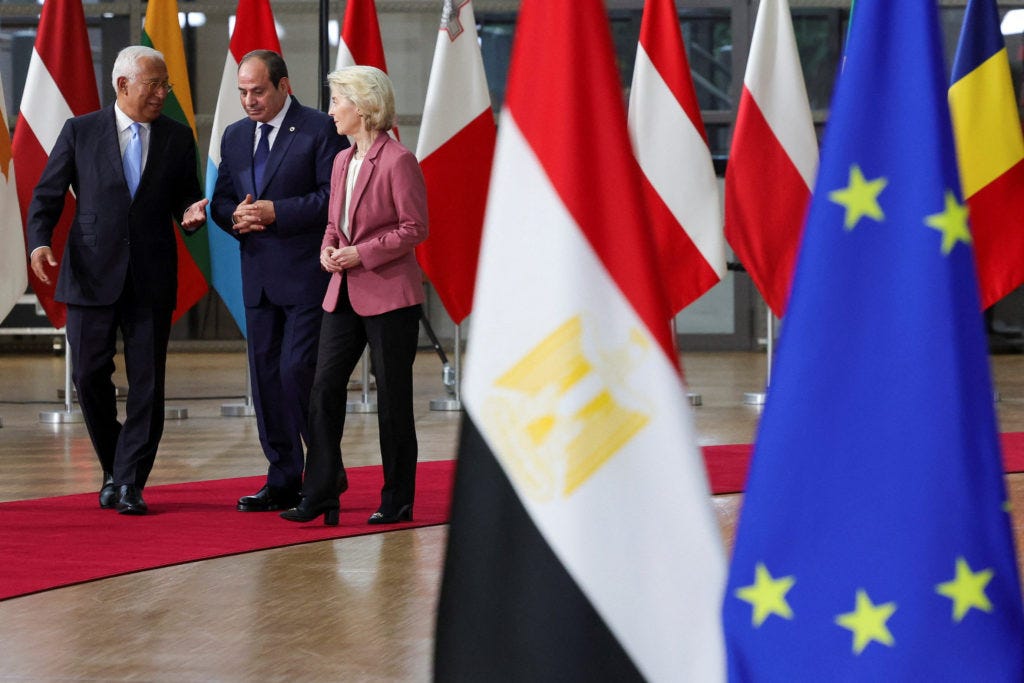EU-Egypt Deal Redefines Gaza Governance, Brussels Trades Aid for Control
Brussels is securing Egyptian compliance with Trump's peace plan.
On 22 October, the European Union announced a $7.9 billion financial package for Egypt, its largest single-country commitment in decades, aimed at anchoring Cairo’s participation in Gaza’s post-war management. Brussels has reframed economic assistance as a geopolitical instrument, linking Egypt’s fiscal recovery to its enforcement role under the Trump peace framework and the demilitarisation of Hamas. The joint statement issued after the first EU–Egypt summit in Brussels confirmed this conditionality, presenting the funds as support for industrial development, energy reform, and small enterprises, yet implicitly tying them to security deliverables across Gaza and the Sinai corridor.
Economic Leverage, Political Bargain
Under the Strategic and Comprehensive Partnership signed in 2024, cooperation initially centred on economic stability and mobility. The 2025 summit has transformed that framework into a direct exchange: financial rescue for regional enforcement. The EU’s $7.9 billion commitment, equivalent to roughly 2% of Egypt’s GDP, will be disbursed through loans and grants over three years. Officials in Brussels described the package as “support for Egypt’s resilience,” yet its substance lies in enabling Cairo to implement and monitor Gaza’s demilitarisation process while maintaining border stability.
Egypt’s economic pressures remain severe. Inflation has exceeded 30%, Suez Canal revenues have declined sharply due to Red Sea disruptions, and tourism receipts have struggled to recover. In this context, the EU package functions as both a stabiliser and a strategic inducement. “This is not charity, it is a shared investment in regional order,” said European Council President António Costa following the summit. For Cairo, the funding offers crucial liquidity and renewed access to European capital markets. For Brussels, it secures a regional actor capable of advancing Western security goals without direct European deployment.
The reactivation of the EU Border Mission at Rafah under Egyptian oversight formalises this arrangement. Cairo will coordinate humanitarian access while supervising the disarmament and reconstruction processes envisaged in the first phase of the Trump peace plan. The mechanism positions Egypt as both gatekeeper and guarantor, translating financial aid into operational authority along Gaza’s southern frontier.
Cementing IMEC
The EU–Egypt agreement is part of a wider European reorientation toward structured partnerships across the eastern Mediterranean. Egypt has strengthened its alignment with Europe through energy interconnectivity, green hydrogen projects, and the India–Middle East–Europe Economic Corridor (IMEC), which Brussels now views as a vehicle for long-term integration. This convergence of infrastructure, trade, and security policy underscores the shift from aid to strategic interdependence.
For the EU, the partnership embeds its policy objectives within Egypt’s security architecture, allowing Brussels to project stability while maintaining political distance from Gaza’s volatile theatre. For Egypt, it restores geopolitical prominence, transforming its mediation role into co-management. A UN-mandated stabilisation force, expected to be chaired by Cairo and financed by European funds, would consolidate this new division of labour: Egypt delivers control, Europe provides capital, and Gulf states underwrite reconstruction spending.
Among regional actors, Israel gains a security buffer, Gulf partners secure predictable reconstruction channels, and the EU positions itself as the primary financial architect of Mediterranean stability. Together, these interests converge on a transactional logic that prioritises containment over reform. The outcome is a model of pragmatic alignment, money exchanged for delegated enforcement. Whether this equilibrium produces lasting stability or deepens dependency will depend on Egypt’s capacity to sustain Gaza’s demilitarisation without igniting broader confrontation. For now, Brussels has paid for calm, and Cairo has monetised control.




